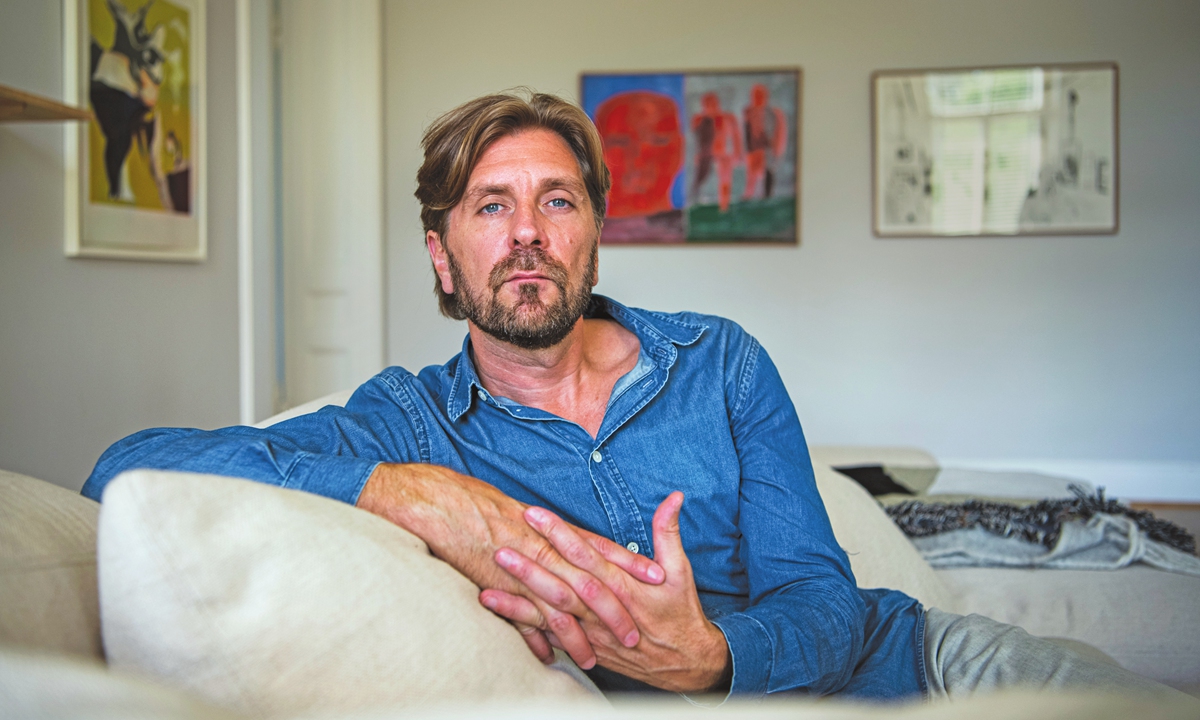Director Ruben Ostlund talks about his new film and questions Western morality
Source: AFP Published: 2020/9/3 16:58:42

Ruben Ostlund Photo: AFP
He won the 2017 Palme d'Or for his art world satire The Square that dissected ethics and morality. In his new film, Ruben Ostlund probes society's focus on looks and spiraling consumption.
The Swedish director is decidedly affable, with a seemingly permanent smile in the corner of his mouth while doing constant battle with a lock of auburn hair falling into his eyes.
He has just returned from Spain, where he's been editing his latest satire called Triangle of Sadness.
In his fifth feature-length film, Ostlund, 46, again holds up a magnifying glass to Western values and norms.
He's briefly in his native Gothenburg, in western Sweden, before heading off to Greece to continue shooting.
He's been keenly following the Black Lives Matter protests against racism and police violence.
His 2011 film Play took on systematic racism, where five black kids rob three white and Asian children.
"I'm a racist but I don't want to be. And that's a much more interesting discussion - to recognize that, in our group behavior, our way of thinking, we assign a bunch of qualities to people we're not familiar with. And it's just a normal survival instinct," Ostlund tells AFP in his comfortable downtown apartment.
"We are racists, we are. But we can also fight to not be, and we can want to not be racist."
He wonders however about the sincerity of reactions to upsetting images in the media, depicting everything from police brutality to dead migrant children.
"It's the strongest image that wins and so how do we handle all of these issues that demand our compassion? Should our commitment in that particular instant decide" our course of action, he asks.
His new film also takes a caustic swipe at philanthropy.
Modern societies lose their way once they begin to rely on the individual, rather than the state, to ensure a population's well-being, Ostlund says.
Ostlund is also an obsessive anti-capitalist. According to him, in order to understand human nature, you have to first understand that people are just pawns in an economic system.
Yet the speed at which the COVID-19 crisis led entire societies to lock down surprised him.
"I thought the market forces gave in very quickly. Suddenly they agreed to shut down society," he says in amazement.
So what will the world look like after the coronavirus crisis?
He echoes the words of French contemporary author Michel Houellebecq: "The same, but a bit worse."
"The biggest players have gotten even bigger while the local corner shops have disappeared or been bought up by a big chain. It's incredibly insidious."
Triangle of Sadness is set in the world of supermodels and the rich.
A group of passengers and a maid from a luxury cruise ship end up stranded on a deserted island where their money and status have to take a backseat to their fight for survival - but status ultimately returns.
As in Ostlund's two previous films, the main character is a man searching for his place in the world.
In the film, Carl is a model whose career is flagging, while that of his girlfriend, also a model, is soaring.
In the modeling world, men typically earn four times less than women, allowing Ostlund to explore what happens when you "reverse gender power structures."
The coronavirus pandemic has delayed production of the movie, but Ostlund hopes it will be screened at the 2021 Cannes Film Festival.
The movie is his first English-language feature film - a requirement from one of the financiers - launching him into a new forum.
"Suddenly you're there competing in a different arena with all the other English-language films, whereas before you were in the position of 'interesting foreign-language film director,'" he says.
He does have some misgivings.
"I can dislike the fact that the Anglo-Saxon culture has taken over so much, if you look at how dominating it has been in the entertainment business and in the film world."
Ostlund says he remains committed to "the intellectual aspect of cinematic art that aims to provoke a discussion."
"You shouldn't try to please the public too much."
Newspaper headline: ‘Triangle sadness’